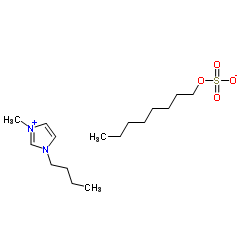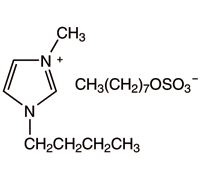1-丁基-3-甲基咪唑辛硫酸盐, 99.9%,1-Butyl-3-methylimidazolium octyl sulfate
产品编号:西域试剂-WR369171| CAS NO:445473-58-5| MDL NO:MFCD03788914| 分子式:C16H32N2O4S| 分子量:348.5
本网站销售的所有产品仅用于工业应用或者科学研究等非医疗目的,不可用于人类或动物的临床诊断或者治疗,非药用,非食用,
| 产品名称 | 1-丁基-3-甲基咪唑辛硫酸盐, 99.9% |
|---|---|
| 英文名称 | 1-Butyl-3-methylimidazolium octyl sulfate |
| CAS编号 | 445473-58-5 |
| 产品熔点 | 37°C |
| 产品密度 | 1.07 g/cm3 |
| 精确质量 | 348.208282 |
| PSA | 83.62000 |
| LogP | 4.01720 |
| 外观性状 | solid | beige |
| 稳定性 | 按规定使用和贮存不会分解 避氧化物 |
| 储存条件 | 密闭,阴凉,干燥处 |
相关文档
化学品安全说明书(MSDS)
下载MSDS质检证书(COA)
相关产品
| 危害码 (欧洲) | Xi: Irritant; |
|---|---|
| 风险声明 (欧洲) | R36/37/38 |
| 安全声明 (欧洲) | 36/37 |
| 海关编码 | 2933290090 |
|
Section 1: Product Identification Chemical Name:1-Butyl-3-methylimidazolium octylsulfate, 98% [BMIM] [OctSO4] CAS Registry Number:445473-58-5 Formula:C16H32N2O4S EINECS Number:none Chemical Family:organic amine salt Synonym:3-Butyl-1-methyl-3H-imidazol-1-ium; octylsulfate
Section 2: Composition and Information on Ingredients IngredientCAS NumberPercentACGIH (TWA)OSHA (PEL) Title Compound445473-58-5100%no datano data Section 3: Hazards Identification Emergency Overview:Irritating to skin, eyes and mucous membranes. May be harmful if swallowed. Primary Routes of Exposure:Ingestion, eyes, inhalation of dust Eye Contact:Causes slight to mild irritation of the eyes. Skin Contact:Causes slight to mild irritation of the skin. Inhalation:Irritating to the nose, mucous membranes and respiratory tract. Ingestion:May be harmful if swallowed. No specific information is available on the physiological effects of ingestion. Acute Health Affects:Irritating to skin, eyes, and respiratory tract. Chronic Health Affects:No information available on long-term chronic effects. NTP:No IARC:No OSHA:No SECTION 4: First Aid Measures Immediately flush the eyes with copious amounts of water for at least 10-15 minutes. A victim may need Eye Exposure: assistance in keeping their eye lids open. Get immediate medical attention. Wash the affected area with water. Remove contaminated clothes if necessary. Seek medical assistance if Skin Exposure: irritation persists. Remove the victim to fresh air. Closely monitor the victim for signs of respiratory problems, such as difficulty Inhalation: in breathing, coughing, wheezing, or pain. In such cases seek immediate medical assistance. Seek medical attention immediately. Keep the victim calm. Give the victim water (only if conscious). Induce Ingestion: vomiting only if directed by medical personnel. SECTION 5: Fire Fighting Measures Flash Point:none Autoignition Temperature:none Explosion Limits:none Extinguishing Medium:carbon dioxide, dry powder or foam Fire fighters should be equipped with a NIOSH approved positive pressure self-contained breathing apparatus Special Fire Fighting Procedures: and full protective clothing. Hazardous Combustion andIf involved in a fire this material may emit toxic organic fumes. Decomposion Products: Unusual Fire or Explosion Hazards: No unusual fire or explosion hazards. SECTION 6: Accidental Release Measures Spill and Leak Procedures:Small spills can be mixed with vermiculite or sodium carbonate and swept up. SECTION 7: Handling and Storage Handling and Storage:Store in a cool, dry place in a tightly sealed container. SECTION 8: Exposure Controls and Personal Protection Eye Protection:Always wear approved safety glasses when handling a chemical substance in the laboratory. Skin Protection:Wear protective clothing and gloves. Consult with glove manufacturer to determine the proper type of glove. Ventilation:If possible, handle the material in an efficient fume hood. If ventilation is not available a respirator should be worn. The use of respirators requires a Respirator Respirator: Protection Program to be in compliance with 29 CFR 1910.134. Ventilation:If possible, handle the material in an efficient fume hood. Additional Protection:No additional protection required. SECTION 9: Physical and Chemical Properties Color and Form:beige solid Molecular Weight:348.51 Melting Point:37° Boiling Point:no data Vapor Pressure:not applicable Specific Gravity:no data Odor:none Solubility in Water:soluble SECTION 10: Stability and Reactivity Stability:hygroscopic Hazardous Polymerization:no hazardous polymerization Conditions to Avoid:contact with moisture Incompatibility:strong oxidizing agents Decomposition Products:carbon dioxide, carbon monoxide, nitrogen oxides, and organic fumes. SECTION 11: Toxicological Information RTECS Data:No information available in the RTECS files. Carcinogenic Effects:no data Mutagenic Effects:no data Tetratogenic Effects:no data SECTION 12: Ecological Information Ecological Information:No information available SECTION 13: Disposal Considerations Disposal:Dispose of according to federal, state, and local regulations. SECTION 14: Transportation Shipping Name (CFR):Non-hazardous Hazard Class (CFR):NA Additional Hazard Class (CFR):NA Packaging Group (CFR):NA UN ID Number (CFR):NA Shipping Name (IATA):Non-hazardous Hazard Class (IATA):NA Additional Hazard Class (IATA):NA Packaging Group (IATA):NA UN ID Number (IATA):NA SECTION 15: Regulatory Information TSCA:Not listed in the TSCA inventory. SARA (Title 313):Title compound not listed. Second Ingredient:none SECTION 16 - ADDITIONAL INFORMATION N/A |









 浙公网安备 33010802013016号
浙公网安备 33010802013016号